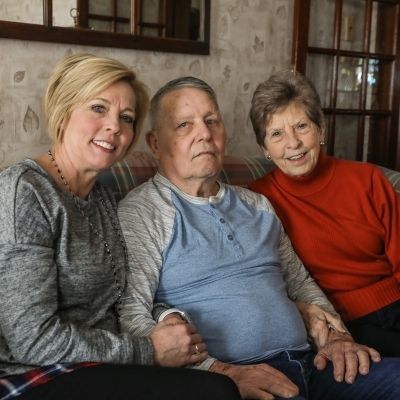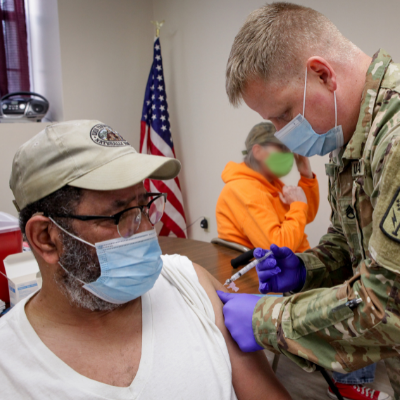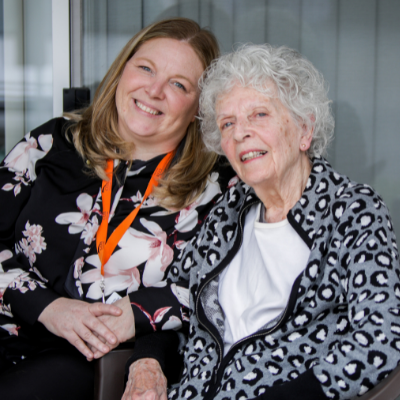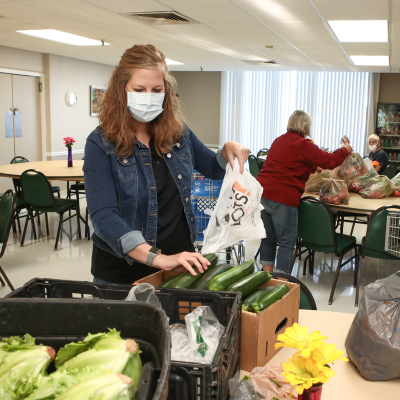Below are the full success and client stories from the Clinton County Elderly Services Program (ESP) 2021 Annual Report. These stories illustrate the impact ESP has on older adults and caregivers in Clinton County.
Click here to view the program’s 2021 annual report. To request a paper copy, email us.
ESP helps the “James Brown of Wilmington” stay in his home full of memories

Church, dogs and James Brown – these are the things that touch Dennis’ heart, lifting him up when times are hard. In his 78 years, he has endured and overcome much: cancer, the death of his wife, and the deaths of several children, including a son who collapsed in Dennis’ front yard from an asthma attack. Dennis had a memorial cross made to mark the spot.
“I have had a lot of tragedy,” he said. “I can feel it too. It gets a little lonely in this house. I have my moments and shed a few tears about that.”
But, he said, the house is where his wife and son died and he wants to keep his memories there. “It’s important to stay here. I don’t know what I would do if I had to leave.”
The Clinton County Elderly Services Program (ESP) provides homemaking services and an emergency response device for Dennis. He has received pest control for fleas brought by his dear dog companions, Genesis and Miracle. The program is also installing a handrail at his front steps. Gout in his legs often makes walking difficult.
Dennis learned about ESP when the program provided a home-care nurse and adult day services for his wife before she died two years ago. “They treated her real well,” Dennis said.
Born and raised in Wilmington, Dennis worked 20 years as a bit straightener for the Irwin Industrial Tool Company. Then, in a complete switch, he worked five years as a corrections officer at Lebanon Correctional Institution. In a word, he said, that job was “challenging.” “The things I seen in there…,” he said, shaking his head.
Except for a three-year stint in the Army in the early 1970s, Dennis has spent his life in Wilmington. He enjoyed fame as a James Brown impersonator, entertaining over the years at parties and the VFW Hall. A photo of Brown sits on Dennis’ coffee table near a foot-high doll of the King of Soul.
And then there is his James Brown look-alike wig. “This ain’t my hair; I’m fine with saying that,” Dennis said. “I wear this all the time except when I go to bed. I’m the James Brown of Wilmington.”
He is no less known for generosity, serving in earlier days as a church caretaker and recently buying groceries for a couple when he saw them at the store putting items back because they couldn’t pay. Dennis’ beloved community at Cornerstone Baptist Church means everything to him. “When my son died, I was in church the next day,” he said. “I go every Sunday. Never miss. They love me. That’s where I get my peace.”
New financial management services provider makes it easier for ESP clients to hire their own caregiver

As ESP’s administrator, COA contracts with organizations to deliver services to clients. Contracts are awarded through a competitive bidding process via requests for proposals (RFPs). The goal of the RFP process is to identify and contract with service providers who can offer the highest quality services at the lowest possible cost in order to serve as many older adults as possible with the available tax dollars.
In September, COA issued an RFP for Financial Management Services (FMS) in the Elderly Services Program. The FMS provider supports ESP clients who utilize the program’s consumer-directed care option to recruit and hire their own aides. In this case the ESP client or designated family member is the “employer” and the aide they hire is their “employee.” The FMS provider, on the client’s behalf, manages all the financial and payroll related responsibilities in addition to criminal background checks that go along with being an “employer.”
COA received six proposals in response to the RFP. After all bids were scored, Palco, Inc. was selected as the new FMS provider. The new contract took effect in January 2022 and the process of transitioning current consumer-directed care clients is now underway.
“The new contract with Palco could not have come at a better time,” said Ken Wilson, COA’s vice president of program operations. “There is a severe shortage of home health aides which is impacting ESP’s ability to match clients with home health aides through traditional avenues such as home care agencies. The FMS provider is a key partner in helping us expand the consumer-directed care option of ESP, enabling older adults to work outside of those traditional sources to hire their own aides or caregivers.”
Wilson added that Palco has a history of working with older adults who use programs like ESP to hire their own aides. He said with the transition to Palco, clients who hire their own caregiver can expect a faster enrollment process with expert customer support. “Ultimately, this means we’ll be able to expand the consumer-directed care service to more older adults,” Wilson said.
Council on Aging helps older adults get COVID-19 vaccinations

2023 Update: Due to the end of the COVID-19 pandemic, this program is no longer available. Vaccines may be available at private doctor offices, pharmacies, workplaces, community health clinics, health departments or other community locations, such as schools and religious centers. If your primary healthcare provider does not stock all the vaccines recommended for you, ask for a referral. You may also find locations providing the flu and COVID-19 vaccines in your community at www.vaccines.gov.
Since February 2021, Council on Aging (COA) has played a key role in helping more than 3,000 area older get vaccinated against COVID-19, while helping countless others connect to information about the available vaccines.
When Ohio rolled out its statewide COVID-19 vaccination plan in February 2021, older adults were among the first eligible groups to receive a vaccination. However, older adults had difficulty getting vaccinated for two primary reasons: 1) there was not enough vaccine to meet the demand; and 2) most vaccine registration systems required use of a computer or smart phone to make an appointment – a barrier for many older adults. There was also confusion about where older adults could go for assistance in navigating a fragmented vaccine system.
COA helped older adults overcome these barriers by:
- Helping older adults find vaccine providers in their community. COA staff monitored local vaccine availability and helped older adults schedule appointments or join applicable waiting lists.
- Providing no-cost, roundtrip transportation to vaccination appointments for eligible older adults.
- Assisting the Ohio National Guard with vaccination clinics at low-income senior apartment buildings in the region, including coordinating busing from nearby senior communities to maximize the number of people vaccinated at each clinic. Governor Mike DeWine and First Lady Fran DeWine attended one of these clinics and praised Area Agencies on Aging for their work in helping older adults through the pandemic.
“This is the first time COA has worked with the National Guard to vaccinate older adults in this way,” said Ken Wilson, COA’s vice president of program operations and a lead coordinator for the vaccination clinics. “There was a lot of coordination and planning that went into these clinics. It was great to see everyone working together with one goal in mind: protecting vulnerable older adults from COVID-19.”
Residents who came for vaccine appointments showed a range of emotions. Some were apprehensive about getting a new vaccine, but recognized it was their best option for getting their lives back to normal.
“I never get the flu shot,” a resident at an area senior apartment building reported, “but I thought this was important.”
In March 2021, COA began working with local health departments to vaccinate homebound older adults. For many older individuals, leaving their home to get vaccinated could result in serious physical hardship or present a danger to their health. As a result, COA advocated at the state and local level for a process to vaccinate homebound older adults.
“We’d been helping older adults get vaccinated since Ohio’s vaccination plan went into effect,” said Ken Wilson, COA’s vice president of program operations. “From the beginning, we worked to find a way to vaccinate older adults who could not leave their homes. Because COA provides in-home care services to homebound older adults in southwestern Ohio, we were in a good position to identify who in the community needed this service.”
COA worked with local health departments to develop a plan to vaccinate homebound older adults. Using the Centers for Disease Control and Prevention’s (CDC) guidelines for vaccinating homebound individuals and a locally-developed screening tool, COA built a list of individuals who qualify for in-home vaccination in southwestern Ohio. The list included COA clients, as well as individuals from the community not enrolled in a COA program. In all, nearly 30 Clinton County older adults were referred to local health departments for in-home vaccinations.
On a weekly basis, COA provided local health departments with a list of homebound individuals in their jurisdiction. Health departments then contacted these individuals to schedule their appointment. This work continues as older adults continue to get vaccinated against COVID-19.
“Some people think because they’re homebound, they’re not high-risk, but it’s actually quite the opposite,” Wilson said. “Most homebound individuals have two or more health conditions which put them at risk for severe complications, hospitalization or even death from COVID-19. And, these individuals have people who are coming and going from their home – caregivers, home health care and others – which can increase their risk of exposure.”
In September, Council on Aging received a Clinton County Community Champion Award (C4) for developing the Homebound Vaccination Program. The C4 Awards were presented by the Wilmington-Clinton County Chamber of Commerce — along with 2021 Premium Sponsor, the Clinton County Convention and Visitors Bureau (CVB) — to highlight the stories of the Clinton County citizens, employers and employees, and organizations who are making an impact in the community. COA was recognized in the award program’s healthcare category. Read more…
COA’s efforts to help older adults get vaccinated against COVID-19 continue. A major focus at the time of this writing is booster shots. Booster shots are important because the vaccine’s effectiveness at preventing serious illness lessens over time – especially in people age 65 and older.
Links to more reading:
- COA, National Guard partner on vaccination clinics in low income senior buildings
- COA helps older adults access COVID-19 vaccine
- Town Halls to prepare buildings for vaccination clinics
- Council on Aging helping to vaccinate homebound older adults
- COA receives community champion award for vaccinating homebound older adults
Woman settles down in Clinton County, with ESP for support

Peggy has led a peripatetic life, living off and on in Maryland, Hawaii and southern California before returning to Ohio where she grew up.
She has settled now in Wilmington, moving recently from a large Victorian home into a temporary apartment and looking forward to the day when she can relocate to Clinton County Community Action housing. “I’m number 101 on the waiting list,” she said.
Because of neurological problems in her legs, Peggy uses a walker and receives homemaking services once a week from the Clinton County Elderly Services Program (ESP). After Peggy fell and broke her hip two years ago, her daughter-in-law did some research and told her about the program. “The services have been great,” Peggy said. “I have absolutely no complaints at all. The program is wonderful.”
Peggy’s frequent moves in her earlier life were due to her former husband’s career at the National Security Agency (NSA). His work in national intelligence took him to Vietnam and other countries in East Asia, but Peggy did not travel with him because of their two sons.
The couple met at Antioch College where he was acting in the Shakespeare Festival and she worked in the theater box office. They shared an interest in theatre and both had acting gigs over the years.
The marriage didn’t last, though, and Peggy made her way to southern California, where she worked as a substitute teacher for students with learning disabilities.
Life in California was too expensive for a substitute teacher’s salary though, so Peggy returned to Ohio. She continued to work as a substitute teacher, but also sold appliances for Sears.
Today, she’s organizing her new place after downsizing and participating in a writer’s group as she works on a book about her adventures.
“It’s been five years of work,” she said. “I have to tell about all these moves and the crazy life I lived as an NSA wife for 20 years.”
Voters approve Clinton County senior services tax levy
Older adults and caregivers in Clinton County will continue to have access to the county’s Elderly Services Program (ESP) thanks to the overwhelming support of county voters on Nov. 2.
In Clinton County, 60 percent of voters approved an increase to the county’s senior services tax levy. The levy provides 82 percent of funding for the county’s Elderly Services Program. The 2.35 mill levy (renewal of existing 1.5 mill levy and an increase of .85 mills) will cost homeowners $64.28 per $100,000 of property value annually – an increase of $26.61 per year – or about $2 per month.
Voters had not been asked to approve an increase in the levy since 2008. The increase was needed because revenue generated by the levy had been on the decline. Despite serving 34 percent more clients in 2019 than it did in 2008, the levy generated 6 percent less revenue over the same period. After another year of double-digit growth in ESP (11 percent in 2020), the program had reached the tipping point. As a result, Clinton County Commissioners decided to place the levy on the November 2021 ballot – a year earlier than planned.
“Voters recognize the important role the levy plays in making the community a great place to live for people of all ages, and we appreciate their continued support,” said Ken Wilson, vice president of program operations at Council on Aging. “Senior services levies benefit everyone. They enable family caregivers to continue working, which is good for families, businesses and our economy.”
Council on Aging administers senior services tax levies in Butler, Clinton, Hamilton and Warren counties under contracts with commissioners in those counties.
Program recognized for diverting older adults from hospitals and nursing homes during the pandemic

Council on Aging (COA) received a 2021 Inspire Healthcare award from The Health Collaborative for Discharge to Home, a program developed by COA during the pandemic to provide a safe, supportive path home for older adults being discharged from area hospitals and nursing facilities, while also freeing up valuable healthcare resources.
Inspire Healthcare is the region’s premier healthcare awards event, recognizing regional heroes who are pioneering efforts in improving health and healthcare. COA was a finalist in the program’s Gen-H category, which recognizes compelling programs, policies, system-level or environmental change strategies that improve community health.
“At the start of the pandemic, older adults were getting sick and dying from COVID-19 at much higher rates than the rest of the population,” said Ken Wilson, COA’s vice president of program operations. “Discharge to Home achieved two key goals for our region: it diverted older adults away from COVID hot spots such as nursing homes and rehab facilities, and it helped preserve valuable and limited healthcare resources during peak periods of the pandemic.”
Leveraging an existing transitional care program, FastTrack Home, COA quickly developed and implemented Discharge to Home to provide a centralized process for older adults who were going home from hospitals and nursing facilities but needed supportive services for a safe and effective recovery – regardless of their COVID status.
During the first year of the pandemic, Ohioans aged 60 and older accounted for 65 percent of all COVID-19 related hospitalizations in the state (and 93 percent of deaths). At times, nursing facilities had some of the highest infection and death rates in Ohio. Hospitals wanted to avoid sending patients to nursing homes for recovery, while nursing facilities were looking for safe ways to discharge patients who had completed recovery or therapy and were ready to go home.
Through Discharge to Home, hospital and nursing facility staff could quickly and safely discharge patients home with supportive services. Referrals could be made to COA staff seven days a week via phone, fax, email, or by working directly with COA staff assigned to specific hospitals. COA staff met with patients and families to assess care needs and ensure services were in place when the patient arrived home. Typical services included home-delivered meals, transportation, personal care and housekeeping support.
Discharge to Home included safety measures to protect both care providers and care recipients from the spread of COVID-19. COA adapted service delivery models to protect service providers (home health aides, meal drivers, transportation providers, and emergency response system installers) who were providing services to patients recovering at home with or from COVID-19. These measures also provided protections for patients who had not previously had or been exposed to the virus.
From April 2020 through December 2021, more than 4,600 area older adults have been discharged from area hospitals and nursing facilities using this coordinated process, including 234 Clinton County residents. And, according to state public health data, less than 10 percent of COVID-19 related deaths in long-term care facilities occurred in facilities located in COA’s service area.
About Discharge to Home and FastTrack Home
COA leveraged its award-winning FastTrack Home program to quickly implement Discharge to Home. FastTrack Home focuses on helping older adults complete smooth transitions from one care setting to another – primarily from hospitals or nursing homes, to a patient’s home. FastTrack Home puts temporary in-home care services in place before an older adult goes home from the hospital. While other COA programs require an in-home assessment and focus on meeting long-term needs, FastTrack Home assessments are completed at the hospital bedside and are designed to meet short-term, acute needs. This distinction is key because older adults have an increased risk of illness and injury in the 30 days following discharge from a care facility. With a speedy assessment and enrollment process, FastTrack Home services can be in place when the patient is discharged home.
During the pandemic, more than 40 percent of Discharge to Home patients were routed through COA’s FastTrack Home program, available in Hamilton, Clinton and Warren counties. In counties where FastTrack Home was not available, Discharge to Home patients were connected to supportive services through other COA programs.
Caregiver Support Program now offers overnight respite

Council on Aging’s Caregiver Support Program offers one-on-one support, advice and resources to family and other informal caregivers to help them manage their caregiving responsibilities. And now, the program is also able to offer overnight respite care so caregivers can take a much-needed break.
If appropriate, this service will provide up to seven days (overnight) of care in an area care facility. All of the care recipient’s needs will be met while at the care facility. Caregivers are then free to use this time for respite – rest, catch up on housework or paperwork, visit out-of-town friends/family, take a vacation, etc.
Since overnight respite care was first offered in July, the service has supported 10 family caregivers in COA’s service region by providing 74 days of overnight respite.
“Caregivers give so much of themselves and often neglect their own needs when caring for a loved-one,” said Anna Goubeaux, RN, COA’s caregiver support nurse. “Caregiver burnout is one of the top reasons older adults and people with disabilities end up in nursing homes. Supporting caregivers and giving them much-needed time off benefits everyone.”
COA’s Caregiver Support Program is available at no cost to caregivers or care recipients aged 60 and older. The caregiver must live in Butler, Clermont, Clinton, Hamilton or Warren counties. There is no age requirement for family caregivers who provide care for individuals with Alzheimer’s disease or related disorders with neurological and organic brain dysfunction.
The overnight respite care is available to eligible caregivers of individuals who have a cognitive impairment (Alzheimer’s disease or dementia, for example).
Learn more at https://www.help4seniors.org/programs-services/caregiver-support.
Senior farmers’ market program nearly doubles participants in 2021

In its second year operating in southwestern Ohio, the United States Department of Agriculture Senior Farmers’ Market Nutrition Program nearly doubled in size, providing 2,213 low-income area older adults with fresh, local produce for no out-of-pocket cost. Nearly 80 Clinton County older adults participated in the 2021 growing season, a 24 percent increase over the program’s first year.
Working with community members and the Ohio Department of Aging, Council on Aging brought the program to its service area for the first time in 2020. Despite the challenges and uncertainty posed by the early months of the COVID pandemic, more than 1,100 people participated in the program in its first year.
COA honors area home health aides as 2021 heroes
Home health aides provide critical and often life-saving care for older adults who want to remain in their homes as they age.

In addition to providing personal care and assistance with everyday tasks, home health aides get to know their care recipients intimately and can be the first to notice critical changes in physical and behavioral health. In 2021, COA was pleased to recognize three local individuals as 2021 Home Health Aide Heroes, including Deborah Grant from Clinton County Community Action Agency.
Deborah Grant
Ms. Grant was nominated by Clinton County Elderly Services Program (ESP) Care Coordinator, Carla McCauley, and Linda Rice, the sister of an ESP client. The nomination referenced the long-standing and life-saving care Ms. Grant provided to Ms. Rice’s sister, Sue.
The nomination stated that Ms. Rice appreciated the more than 10 years of care Ms. Grant provided for her sister. Ms. Rice said, “Debbie is invaluable for Sue. They have a long-standing, admirable friendship and know each other well. I don’t live with Sue, so I can’t always be there. Debbie is certainly someone to be counted on. So much so, that Debbie saved my sister’s life.”
Ms. Rice shared that during an appointment in 2020, Ms. Grant arrived at her sister’s home for her scheduled appointment but got no answer at the door. Instead of leaving, Ms. Grant entered the open apartment and found Sue in her bedroom – unresponsive and in trouble. Ms. Grant called 911, likely saving Sue’s life.
Ms. Rice said, “I don’t know if Sue would have made it if Debbie hadn’t gone to the apartment when she did. I can’t say enough about my sister’s services! Thank you for everything you do.”
Click here to read more about how Ms. Grant’s care impacted Sue – and Ms. Rice’s – life.
Ms. Grant received a $500 prize from Counci on Aging.
Click here to read more about the honorees.
